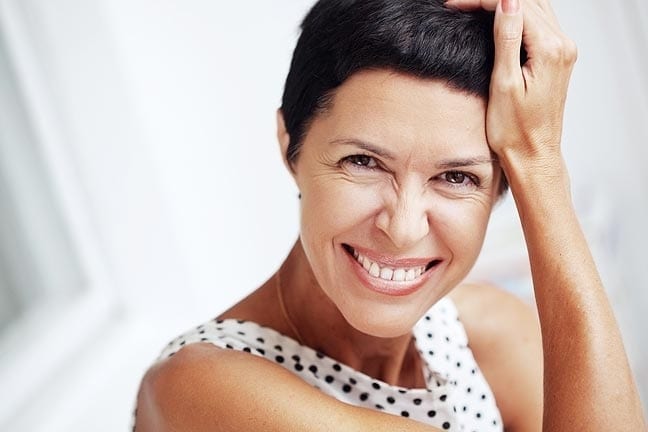We’ve all witnessed the phenomenon: that radiant older woman whose cherub skin seems to (unfairly!) defy the hands of time, and the thirty-something who appears haggard and worn beyond her years. What gives, Mother Nature?
While environmental and lifestyle factors no doubt play a major role in how you age, experts say that pure genetic luck is the foundation of the equation. A 2009 study of twins published in the Archives of Dermatology revealed that up to 60 percent of skin aging is due to genetics, says Dr. Heidi Waldorf, director of laser and cosmetic dermatology at New York’s Mount Sinai Hospital.
QUIZ: How Healthy Is Your Body Skin?
But be forewarned—this fact could work against you if the assumption that you have “good” genetic odds leads you to not care for your skin. “You can have the best genes in the world, but if you smoke or bake in the sun, you’ll look 10 to 15 years older,” says Los Angeles dermatologist, Dr. Ava Shamban. “Moral of the story: Don’t count on your genes to save you from a poor lifestyle. It’s genetics and environmental damage to genetic code that determines the speed you age.“
We asked leading derms to decipher those genetic jackpot clues. If you’re lucky enough to have one or more of the below characteristics and mind your sunscreen and skincare, it’s a good bet you’ll cash in those youthful chips later in life.
Your folks have aged well. That’s right, check out mom and pop. First degree relatives can give you the strongest sense of how you’ll age, since genes direct the cellular functions that have an enormous impact on appearance. “We inherit the rate at which our cells turn over, how quickly damage is repaired, and how much collagen is produced,” says Shamban. More specifically, the sequences of DNA attached to the ends of chromosomes known as telomeres—which allow cells to divide without losing genetic coding—are thought to be inherited. “Recent genetic studies suggest that those with longer telomere sequences live an average of five years longer with healthier-looking skin than those with shorter sequences,” says Shamban. Though take note: Environmental factors like smoking, sun and lack of exercise are thought to be among the biggest threats to the breakdown of telomere coding overtime, no matter what your genetic background.
MORE: Measure Telomeres to Measure Your Life Span?
A baby face. In a society where angular, chiseled features are often glamourized, experts say it’s actually the round-faced among us who will reap the richest anti-aging benefits. Scientists refer to a baby face as a “neotenous” facial structure, which is characterized by large round eyes, round cheeks, a large curved forehead, a small jaw, a small, short nose and features that are located lower down the face. When viewed next to peers in older age, the neotenous-faced will stand out with a fuller, angelic shape reminiscent of childhood. “Folks blessed with this facial type will keep looking young beyond their youth,” says Shamban.
High cheekbones. There’s a reason great bone structure is beloved; it creates the shape of an upside-down “triangle of youth” that dermatologists often refer to as the greatest subconscious indicator that a person is young. With age, jowels and other features can droop, turning that triangle bottom-heavy and making you look old. However, with high cheekbones supporting your face, that triangle shape won’t droop as much, nor as soon. “Look at Sophia Loren, Eartha Kitt, Bo Derek, Linda Evans, Lena Horne and Raquel Welch,” says Montclair, New Jersey derm, Dr. Jeanine Downie. “They’re all great beauties with very high cheekbones who aged so gracefully.” And unlike poreless skin or a tight booty, those cheekbones will stay with you for a lifetime. Color us jealous!




































